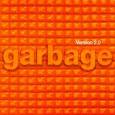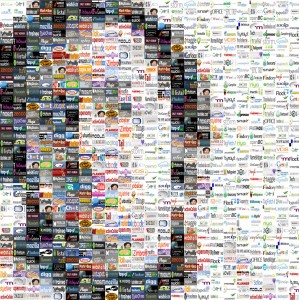Reading the articles for class this week and the discussions around 2.0 software and services got me thinking about the use of 2.0 as a suffix. While it’s used in the academy to represent anything that’s improved or facilitated by the use of social software (or, in the case of library services, denotes using such apparatuses to encourage participation in shaping library programs) and used in the industry to denote events that have been made possible via the use of this technology (see, for example, Lunch 2.0), it’s also often used out of context by a bevy of marketers in order to indicate anything that’s the next version of an older model. Even though 2.0 is now largely a signifier of inclusionary and connective practices that have been altered or are established through social software, I find it interesting that we use 2.0 (or 3.0, or 4.0) as a term to represent the changes that are taking place. Why not “the inclusionary web” or something else that indicates the changes that are occurring in a more easily identifiable / descriptive way? Why is our shorthand so often numeric?
I think that “2.0” and the numeric value system for improvements in technological apparatuses has been a trope for some time now, long before we started attaching it to things like “Web,” “Library,” “Love” or “Me”. I remember way back in the day when my parents got our family’s first computer, and it ran on DOS 3.1 or somesuch – the addition of digits were there to hallmark some incremental change in software, and when there was a major enough revision it would bump up to the next whole number. All it originally was was a way to delineate development in-house, in such a way that the user could easily identify an outdated product.

It was highly useful for this purpose, and then it got picked up by the media to denote any sort of change at all. One of my favorite early 90’s bands, Garbage, even named their second album 2.0.
The changes that are occurring with social software online are happening so fast and are so radical (in relation to the inclusionary paradigms that they promote) that I think we’re using the number system for it not only because we tend to enumerate everything, but also as a means of slowing it down so that it doesn’t seem so overwhelming and out of control. I also largely hear academics and theorists using the term 2.0 far more often than by anyone 20 or under in conversation, the youth who are actually designing many of the programs that are now changing the way we communicate, learn, earn a living and fall in love. Maybe it’s just me (and it definitely might be), but I see the grafting of labels as a means of containment, playing catch-up with the affordances we’re finding in our technologies and their effects on social movements.
I think it’s definitely arguable that the numeric value system has been employed out of tradition and is, in a way, a crutch. It’s a way of rationalizing and compartmentalizing progression in a way that can be easily understood. I think that there’s an innate desire for us to define things in numbers so that we can feel that we’re moving towards something bigger – thinking here of second edition books, second generation iPods, Playstation 2… 3. The number system allows us to interpret things as finished, placing historical caps on events or objects so that we can move onto the next logical step. We’re already seeing Web 3.0, where (from my understanding) the connectivity extends to nearly every piece of machinery that we have to create an even more interactive, humanistic web that’s based on openness – I’ve read lots of shifting definitions, however, and the only thing that seems to be certain that whatever Web 3.0 is going to represent, it will definitely be called Web 3.0.

I think that it’s valuable to attach numeric values to some things, but it’s also very limiting in a way. We tend to disparage first generation things or ideas once the second or third has come out. When we start attaching 2.0 to things like Love or the Self, we run the risk of disqualifying 1.0 concepts as archaic, or worse, redundant as we automatically assume that the original concepts are already embedded in the 2.0, “improved” model. Personally, I’m a big fan of 1.0 when applied to some of the abstract concepts that 2.0 is being grafted onto, and I’m reticent to see them go. For example: The idea that relationships that are facilitated by online dating sites that base your compatibility on a series of inputted statistics for a likely positive outcome is great in some ways, but what I’m concerned with is that it may, because of the terminology (and the excitement behind the technology), become privileged over earlier forms of connecting with others… What about that chance meeting in a coffee shop with someone you find you have nothing in common with, but who compels you nonetheless?
Even applied to technology and software, 2.0 can be a dangerous term because I think we inherently see it as a cutting point, a means of identifying what’s done and over with through retrospect. How much potential do we lose from 1.0 models once the focus has shifted to 2.0? Granted, like the readings state, 2.0 indicates involvement, training and a sense of obligation to improve through contribution, but what if some of the foundations of the way we approach our ideas and online social movements are fundamentally flawed? Not saying they are, of course, but the number system seems to suggest that there are negative associations with questioning the foundations of our paradigms, and to do so would be of as little value as nostalgia.
3 replies on “Thoughts on the Term “2.0””
Hi Scott, I remember Tim O’Reilly stating a defence of Web 2.0 for very similar reasons to what you mentioned in your post. This idea that because we can pin it down to a certain number, a certain time and place, that it may be already part of the past. Tim thought there is still a lot on the way for Web 2.0, to which I agree because it’s often harder to notice the changes as they are happening than after we’ve had time to observe and reflect.
I posted on Vista that this idea reminded me of Periodization. http://en.wikipedia.org/wiki/Periodization
Also, I liked Garbage 2.0 as well!
Never heard of a band named “Garbage” before or Garbage 2.0. Just think of all the funny variants we could come up with using the 2.0 suffix.
Marsden 2.0? 🙂
Dean
p.s. Is there an image you could find from flickr in the CC area that would amplify your blogtext?
Hi Scott,
Some really interesting points you make here. I also wonder that the suffixes of 2.0 and 3.0 do put limitations on aspects of these technologies, and do run the risk of disqualifying some great technologies or aspects of let’s say the 1.0 world, in favour of what is meant to be “new and improved”. Your playstation 2 and 3 example is a perfect representation. The next playstation in the series is always meant to be better, have better graphics, be able to do more things, have increased flexibility, you name it. But wasn’t Super Nintendo loved (and still is loved) for its simplicity? It really makes me wonder if there is a generational gap that seperates older generations as well as our own, with that of the younger generation we are seeing now. I feel older generations put more value in the tools that go into technolgies at the beginning stages, the second stages and every stage there after, whereas younger generations seem to ignore what the values were going into each stage, and really only are interested in the ‘new and improved’ version. Obviously I am largely generalizing here, but this is something I do see.
PS. I know Garbage very well, my 7th grade teacher was a die-hard fan and during rainy lunch days he would expose our class to his favourite band on the old-school cd-player boom box.